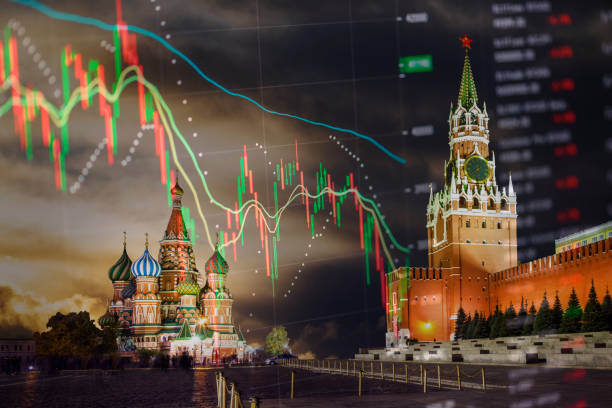Russian Economy Braces for Blow From Collapsing Oil Price
U.S. President Donald Trump's expansive and turbulent raft of tariffs may not have hit Russia directly but might nonetheless serve up a painful blow to Russia's oil export-dependent economy.

Elvira Nabiullina, the governor of Russia's central bank, said last week that tariffs leveled across the world were mostly being felt in Russia through a dip in oil prices. Roughly half the nation's export income originates from oil.
"If such tariff wars, and we are seeing an escalation of tariff wars, continue, it usually leads to a decline in global trade, the global economy, and possibly even the demand for our energy resources," Nabiullina said in remarks reported by state media.
"There are risks here, but we need to watch how the situation unfolds," Nabiullina added.
Although Trump pressed pause on the tariffs he announced last week on multiple countries—with the notable exception of the levies on China—global markets have shuddered since the president's "Liberation Day" on April 2.
Since January 15, the price of Brent crude has fallen from $83 a barrel to $64 today, with West Texas Intermediate tumbling from $78 to $60 in that period.
Russia's economy is battling inflation and bloated by defense spending, as the Kremlin's invasion of neighbor Ukraine rages on. By one measure, Moscow is spending more on its military than all of Europe combined. Russian President Vladimir Putin will likely head off any spending cuts reaching the military for as long as possible, analysts told The New York Times earlier this month.
The tariffs have already had an impact on Russian oil prices, dropping steeply on April 2 and struggling to rise since, said Aura Sabadus, an associate fellow with the Royal United Services Institute (RUSI) think tank and a senior journalist specializing in energy markets with the London-based Independent Commodity Intelligence Services (ICIS).
Prices are roughly $10 a barrel lower since April 2 and are likely to stay put, Sabadus told Newsweek. Russia is "worried," she added.
"While President Trump's goal of imposing tariffs was probably not to crash oil prices, low oil prices will, in the long run, negatively affect Russia's economy," said Kari Liuhto, a professor of international business at Finland's University of Turku.
"However, the price of oil would need to remain low for a couple of years in order to influence the actions of Russia's leadership," he told Newsweek.
Price Cap Impact
In 2022, the G7 nations, Australia and the European Union implemented a price cap of $60 a barrel on Russian crude oil to limit how much Moscow can make from its crude oil exports. The EU is a "non-enumerated" member of the G7 bloc.
Europe broadly rushed to reduce its dependence on Russian oil and gas in the wake of Russia's full-scale invasion of Ukraine in February that year. A host of sanctions have attempted to cut off Moscow's access to its lucrative and vital oil revenues, although Russia's "shadow fleet" of oil tankers designed to ferry Russian oil around the world and skirt sanctions makes up roughly 17 percent of the world's total number of oil tankers, The New York Times reported in December.
The G7 said in December 2023 that a year of the crude oil price cap had reduced Russia's tax revenue from oil and petroleum products exports by almost a third between January and November of that year.
British newspaper The Guardian reported on Sunday that the U.K. and other G7 countries were weighing up lowering the $60 cap after prices fell below this threshold for the first time in years.
Russia's Tass state news agency reported on Thursday that Urals, Moscow's benchmark for oil export pricing, had dropped below $50 per barrel for the first time in nearly two years.
Ray Dalio, a prominent U.S. billionaire hedge fund manager, warned over the weekend that the U.S. was "very close to a recession" over Trump's tariffs and stock market turbulence, and could be staring down "something that is much worse than a recession."
"The fall in the price of oil because of the expected recession in the United States is significant and will have a large impact on Russian oil revenues," said Eric Golson, an economic warfare specialist and associate professor of economics at the U.K.'s University of Surrey.
Oil prices have dipped by about 25 percent so far compared with the average for last year, Golson told Newsweek, equating to an expected yearly revenue loss of $50 billion for Russia.
"Overall, we can expect the tariffs, if they do induce a recession, to be significant net negative for Russia," Golson said.
Russia has managed to relieve some of the pressure of oil sanctions by selling crude oil to third countries, such as India, which is then purchased as refined oil products from these nations by Western countries, Liuhto said. "Russia has been able to find many buyers, particularly China and India," added Sabatus.
Russian Gas 'Really Suffering'
While oil is a larger chunk of Russia's revenues, tariffs could also hit Russian gas exports, namely of liquefied natural gas, or LNG.
"Even though America didn't introduce any tariffs on Russia specifically, it is affected indirectly as a result of the impact on oil prices, and then also on gas," Sabatus said. "It's on gas that Russia is really suffering."
Russia accounted for up to 40 percent of European gas imports before 2022, a figure now hovering at roughly 11 percent, including LNG, she added. Other players like the U.S. and Qatar have stepped into the European market in the years since.
Some in Europe have started flirting with the idea that the continent could restart some Russian gas imports once a ceasefire in Ukraine is inked. Currently, only one pipeline—running through Turkey—can directly supply Russian gas to Europe. The Nord Stream pipeline was blown up in 2022 and Ukraine refused in January to renew a transit deal allowing Russian gas to travel to EU states. Another linking Russia to Poland via Belarus is not operational.
Didier Holleaux, executive vice president at French energy company Engie, told Reuters in an article published on Monday that if there is a "reasonable peace in Ukraine," Europe could "go back to flows of 60 billion cubic meters, maybe 70, annually, including LNG."
In that scenario, Moscow could furnish between 20 percent and 25 percent of the European Union's needs, Holleaux told the news agency.
Others wonder whether Russian exports could return in significant quantities back into Europe as part of a deal designed to make Moscow atone for its invasion of Ukraine, and have Ukraine benefit from this flow.
There are no Pan-European sanctions on Russian gas imports, said Jack Sharples, a senior research fellow at the Oxford Institute for Energy Studies, during a conference at the RUSI think tank on Thursday.
The EU has delayed announcements on its plans to phase out Russian natural gas imports by 2027.
Skepticism does still largely rule. There would be many hurdles to reinstating Russian gas flows through Europe, not least arbitration cases against Russia's state-owned gas giant Gazprom.
Also in the mix are tariffs slapped on Beijing, meaning much of the LNG heading for China is being diverted toward Europe, Sabatus said.
China has put 125 percent tariffs on U.S. imports, battling against the 145 percent levies the Trump administration has fixed on Chinese goods. Beijing's commerce ministry said last week it would "fight to the end" against the "blackmailing nature of the U.S."
"China does not want to fight these wars, but is not scared of them," Liu Pengyu, spokesperson for the Chinese Embassy in Washington, told Newsweek in a statement on Thursday.
These supplies making their way to Europe, as well as American LNG supplies muscling into the market, lessen the demand for Russian exports, Sabatus said. However, there are some concerns in Europe broadly about how much the continent can depend on the U.S., from providing military capabilities to energy.
Russia's prospects of "sending more LNG to Europe—potentially regaining some market share by resuming pipeline exports to Europe—is fading away, at least for the foreseeable future," Sabatus said.










